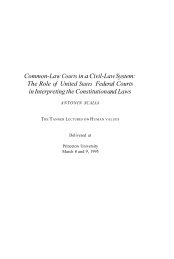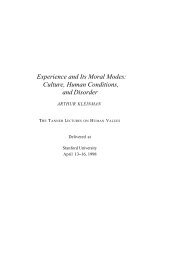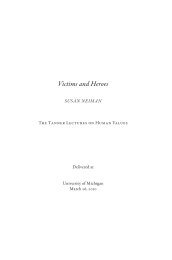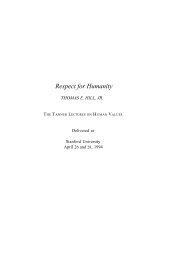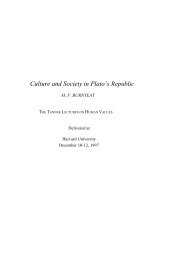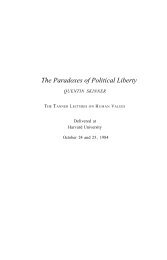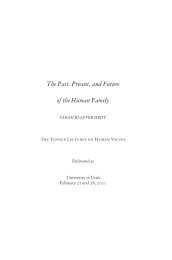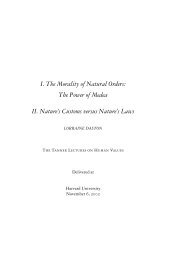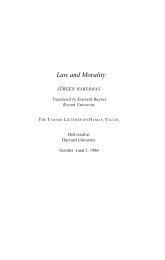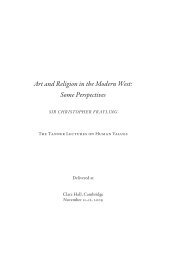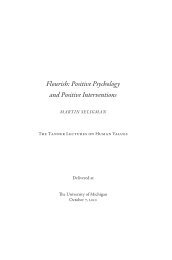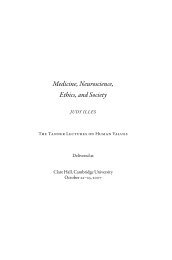Muguerza, Javier - The Tanner Lectures on Human Values
Muguerza, Javier - The Tanner Lectures on Human Values
Muguerza, Javier - The Tanner Lectures on Human Values
You also want an ePaper? Increase the reach of your titles
YUMPU automatically turns print PDFs into web optimized ePapers that Google loves.
[MUGUERZA] <str<strong>on</strong>g>The</str<strong>on</strong>g> Alternative of Dissent 85does not always imply that “Y has the (moral) right to receivesuch and such from X.” For example, I am absolutely c<strong>on</strong>vincedthat we humans have “moral duties” regarding animals and wouldwelcome their having “legal rights” that were recognized in asociety that c<strong>on</strong>siders itself civilized. But I would not allow thatfrom the fact that we humans have moral duties regarding animalsit follows that the latter have moral rights. An animal may wellbe a right-holder in the legal sense when humans bestow this c<strong>on</strong>diti<strong>on</strong><strong>on</strong> it, but no animal will ever be a moral subject. Moralityis the prerogative of men and, of course, women - that is, ofhuman beings - and I do not believe the partisans of moral rightswould be willing to c<strong>on</strong>sider animals holders of such rights, asthey would have to be, however, if those partisans wished topursue the questi<strong>on</strong>able thesis of the correlativity of duties andrights to its final c<strong>on</strong>sequences. But <strong>on</strong>e never knows: in a heateddiscussi<strong>on</strong> I <strong>on</strong>ce heard an American friend, who was a member ofthe Animal Liberati<strong>on</strong> Fr<strong>on</strong>t, speak of “animals’ human rights”(derechos humanos de los animales).But, in c<strong>on</strong>cluding our excursus into ordinary language, Iwould <strong>on</strong>ly like to menti<strong>on</strong> an expressi<strong>on</strong> that <strong>on</strong> the c<strong>on</strong>traryseems to me extremely revealing of certain aspects of the moralphenomenology involved here, an expressi<strong>on</strong> that is furthermorean integral, and colloquial, turn of phrase. I refer, of course, tothe expressi<strong>on</strong> “You’ve no right,” which we so often use independentlyof any legal c<strong>on</strong>text: the expressi<strong>on</strong> “You’ve no right(for example, to treat some<strong>on</strong>e in a manner we judge reprehensible)”is usually accompanied by a feeling of moral indignati<strong>on</strong>which in our example might be a translati<strong>on</strong> of the c<strong>on</strong>victi<strong>on</strong>that “it is denigrating to treat any<strong>on</strong>e that way” or that“such treatment violates his dignity.” But I already warned amoment ago that we would do well to separate the treatment ofhuman dignity from that of the supposed natural rights, and I feelthe same about supposed moral rights, which counsels that wepostp<strong>on</strong>e that subject until the proper time comes.



